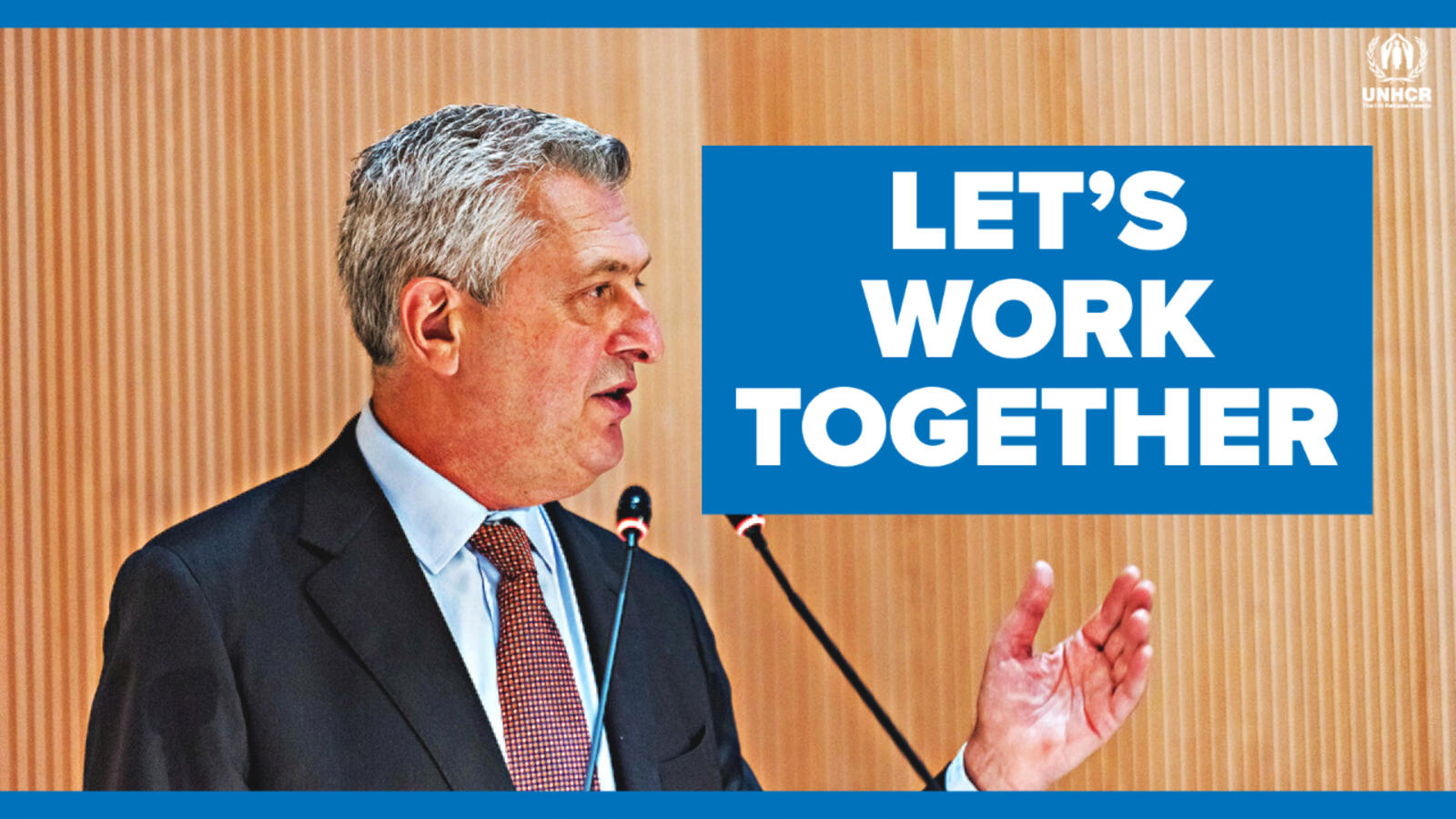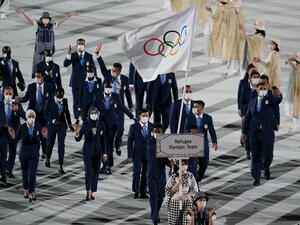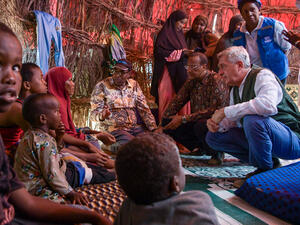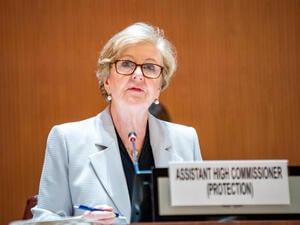UNHCR's Grandi: Greater international cooperation needed to 'solve
multiple crises'
UNHCR's Grandi: Greater international cooperation needed to 'solve
multiple crises'
100 million, UN High Commissioner for Refugees Filippo Grandi tells high-level
meeting.
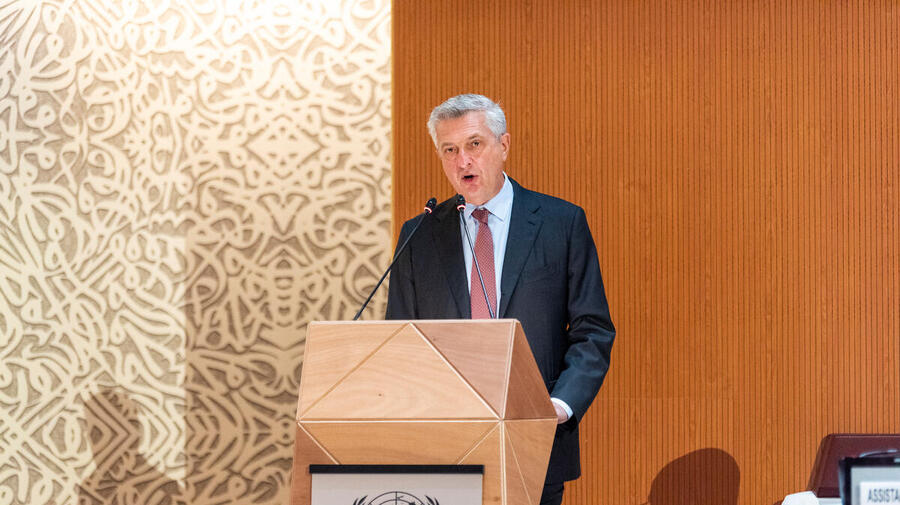
UN High Commissioner for Refugees Filippo Grandi delivers a speech at the 72nd annual Executive Committee meeting at the Palais des Nations in Geneva, Switzerland.
GENEVA – The number of forcibly displaced people worldwide will top 100 million without greater international cooperation to address multiple crises that “erupt or worsen every day around the world,” the UN High Commissioner for Refugees warned at a high-level meeting today.
“Any one of us can see that we are heading in the wrong direction,” Filippo Grandi told UNHCR’s annual Executive Committee gathering in Geneva. “All indicators are telling us to cooperate to prevent it. And yet we seem unable – or unwilling – to step off the paths we are currently on.”
“All indicators are telling us to cooperate."
Grandi highlighted how a failure to equitably distribute vaccines to curb the COVID-19 pandemic has created “a world divided between inoculated and exposed, with disastrous consequences for people on the margins of society,” among them refugees working in the informal sector who were the first to lose their jobs as poverty rates skyrocketed.
At the same time, decades of global inaction to address the climate emergency has had dramatic consequences for refugees, 90 per cent of whom are from countries most vulnerable to its impacts.
Meanwhile, unchecked and unresolved conflicts across the world have led to a doubling in the last decade of the numbers of forcibly displaced, which reached a record 82.4 million at the end of last year.
“If these trends are not reversed by robust conflict resolution efforts, I fear the question will not be ‘if’ we will reach 100 million forcibly displaced; but rather ‘when’,” he told the opening session of the 72nd session of the Executive Committee, which runs through Friday.
Grandi singled out the plight of millions of Afghan refugees who have been uprooted for more than 40 years and others inside the country who now face fresh uncertainty. He stressed that large-scale, unconditional humanitarian assistance must be mobilized now to prevent an aggravation of the crisis and the implosion of public services and the economy.
“And though I am always very prudent in making predictions regarding population movements, I believe that such a deterioration will almost inevitably cause large internal and possibly external displacement,” he said.
Turning to other situations of unresolved conflict, Grandi warned that if the parties to the conflict in Ethiopia do not abandon “a useless, devastating military confrontation in favour of political negotiations,” the humanitarian crisis in Tigray and other regions will “spiral out of control, with more forced displacement occurring inside and outside the country.” He noted a context in which aid personnel face increasing obstacles and unacceptable difficulties, as proven by the recent expulsion of humanitarian staff from the country.
Amid rising forced displacement, the High Commissioner also called out powerful nations in some parts of the world who, instead of giving refuge to those fleeing wars caused by no fault of their own, have kept them out with walls and violent pushbacks, by refusing to rescue people at sea, and through increasingly restrictive laws.
Grandi said proposals to externalize or outsource asylum obligations to other countries were in fundamental breach of basic responsibility-sharing commitments. He also highlighted a “worrying trend ... where States encourage refugees and migrants to move to other countries through dangerous means for purely political purposes, unrelated to their need for protection.”
“Well-managed borders and access to asylum are not incompatible – quite the contrary,” he said. “Good management does not preclude asylum claims from being heard in a fair and fast system; or those in need of international protection from being admitted and helped.”
Despite a challenging global outlook, Grandi highlighted progress in supporting peace efforts in South Sudan and Sudan, under the leadership of the two governments and the Intergovernmental Authority on Development, or IGAD. With World Bank support, solutions are being sought for more than seven million refugees and internally displaced people from the two countries.
Cooperative efforts have also created temporary solutions for millions of forcibly displaced Venezuelans. Grandi highlighted the “exemplary” role of Colombia in granting temporary protection status to over 1.7 million Venezuelans, allowing them to stay, work, and access social services like education and health. The move, which also allows displaced people to contribute to the country hosting them, is being taken up by other countries in Latin America and the Caribbean, he said.
"If we work together with courage and humility, and in a true spirit of solidarity ... then we have a chance to succeed.”
The High Commissioner also highlighted progress stemming from the Global Compact on Refugees and the follow-up Global Refugee Forum in December 2019, where more than 1,400 pledges have led to policies and investments from public and private sources.
“These investments, in turn, have lifted the living conditions not just of refugees, especially in protracted crises, but also of host communities, often helping develop remote areas and invest in infrastructure that will remain once refugees return home,” Grandi said.
While the world faces “terrifying challenges,” Grandi urged delegates not to lose heart, but to take inspiration from the “courage and resilience which uprooted people continue to show.”
The refugee athletes who “triumphed over every adversity” at the Tokyo Olympic and Paralympic Games in August “are living examples of why we must not give up. Of why we must address the challenge of forced displacement – and all other global challenges – patiently, persistently, systematically.”
“None of us can do this alone. But if we work together – together! – with courage and humility, and in a true spirit of solidarity, putting the common good before individual and national considerations, then we have a chance to succeed.”

